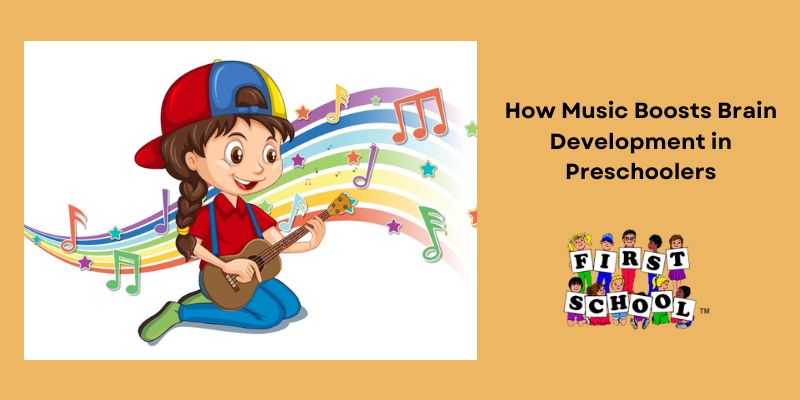



Music profoundly impacts preschoolers, influencing everything from language development to emotional well-being. The benefits of music extend beyond simple enjoyment, playing a vital role in shaping a child’s brain. Research shows that music stimulates the brain, enhancing memory, language, and motor skills.
Let’s explore how music boosts brain development in preschoolers and offers practical ways to integrate it into daily life.
Music in early childhood is more than just fun, it gives the brain a real workout! When preschoolers sing, dance, or play instruments, it activates key brain areas like:
Studies show that music strengthens brain connections, helping kids learn faster and improve skills like language, memory, and focus. Children who engage with music regularly also tend to show stronger communication and problem-solving abilities, making music a powerful tool for early growth.
In short, music and brain development in early childhood are closely linked, turning simple songs into powerful learning tools!
Music helps preschoolers remember information by reinforcing patterns and aiding recall. Simple, repetitive songs like “ABC” and “Twinkle, Twinkle” are not just catchy tunes, they serve as memory aids, making learning fun and easier. Musical patterns link sounds with meaning, which enhances the child’s ability to retain key concepts, such as numbers, letters, or colours, through engaging repetition.
Music’s rhythm plays a vital role in speech development by helping children recognize and process speech patterns. Songs with varied lyrics and repetitive lines expand vocabulary, improve comprehension, and support pronunciation skills.
By singing along to these songs, children naturally absorb new words, which helps them in everyday communication and literacy development.
Preschool music therapy encourages movement, benefiting both gross and fine motor skills. Preschoolers learn to move their bodies in time with music, helping them develop coordination and balance.
Simple activities like dancing to a song or playing instruments such as tambourines and maracas help strengthen muscles, improve hand-eye coordination, and build the physical foundation for more complex skills, like writing and drawing, later on.
Group music activities allow children to interact, teaching them cooperation, turn-taking, and shared attention. Music also helps children express their emotions through singing or playing, whether joy, excitement, or frustration.
This emotional expression fosters self-regulation and empathy, allowing children to better understand their feelings and those of others, promoting emotional intelligence and social harmony.
Incorporating music into your child’s daily routine doesn’t have to be complicated. Here are some simple ways to use music to support development at home and in the classroom:
Regular exposure to music is key. Aim for short bursts of music, such as 10-15 minutes daily, to get the benefits without overwhelming your child.
Classical music, especially works by composers like Mozart, has been shown to stimulate brain development. However, various music genres, including nursery rhymes, folk songs, and world music, can support different growth aspects.
Informal musical play can greatly benefit preschoolers. Depending on the child's interest and readiness, formal lessons can begin around ages 5 to 7.
Music plays a vital role in boosting brain development in preschoolers, enhancing their memory, language, motor skills, and emotional intelligence. By incorporating music into daily routines, parents and educators can support children’s growth in a fun and effective way. Make music a regular part of your child’s day, whether through singing, dancing, or playing instruments, and watch them thrive.
At First School, we believe in the power of music to nurture young minds. Start integrating music into your child’s learning today and experience the benefits firsthand.
Contact Us for more information!